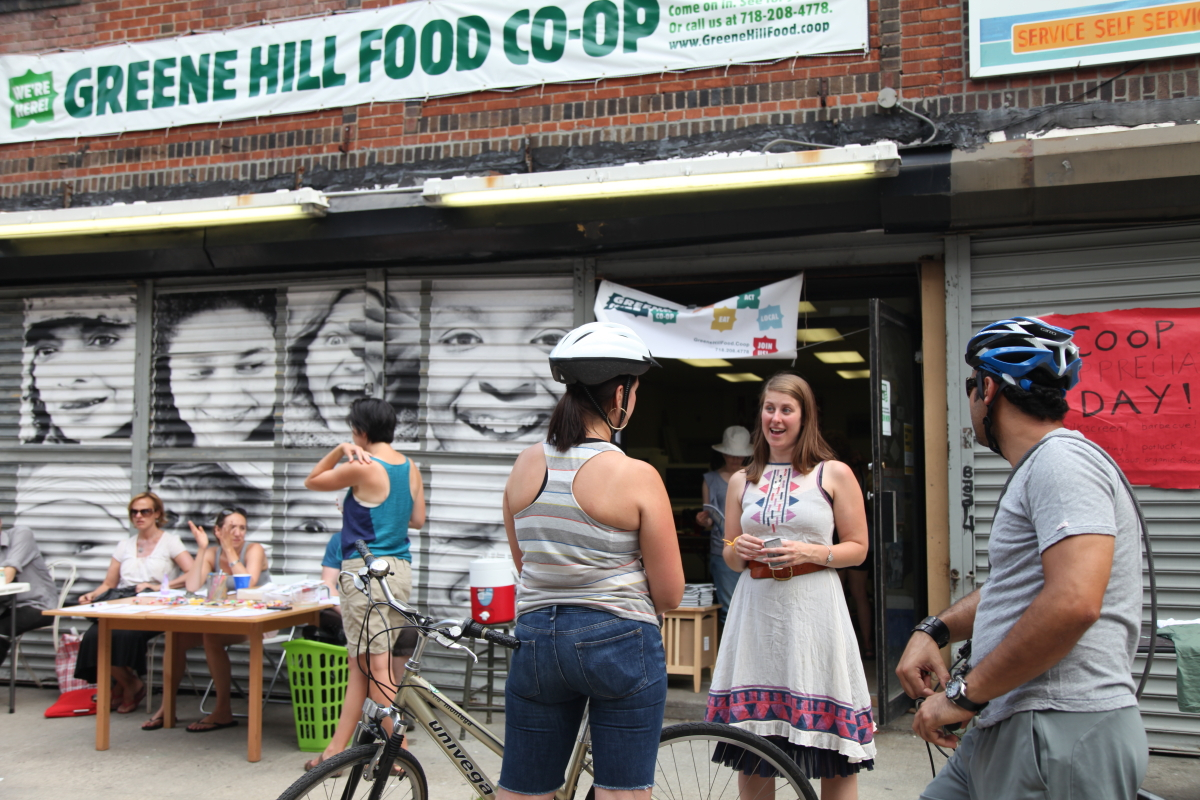

The photos on the storefront of the new member-owned Greene Hill Food Co-op are comprised of people from its surrounding communities, signifying the co-op’s desire to be a resource for a neighborhood, which doesn’t have much access to cheap and fresh locally grown food. Located at 18 Putnam Avenue, on Grand Street in Clinton Hill, the food coop is meant to serve Fort Greene, Clinton Hill and Bed-Stuy, where the food options consist of chain grocery stores or a small number of boutique shops that might stock local food for a premium price.
Since January, Greene Hill has operated as a members-only buying club, with twice-weekly pick-ups. Shoppers must become members by agreeing to show up for work shifts and by paying $175, and then order online and pick up local produce, grains and other products the following Wednesday. The store plans to open its 2,700-square foot storefront this fall at first just for eight hours a week. The current membership base hovers around 385 members, and their target goal is to reach over 700 by the fall. To that end, the co-op has been conducting active recruitment drives–there’s one tonight from 7 to 9:30 p.m. at 138 South Oxford Street,
Studio G–with hopes that the whole community will get involved.
Lancaster Farm Fresh Cooperative in Leola, Pennsylvania is Greene Hill’s primary provider of fruits and vegetables, pasture-raised meats, dairy products, gluten-free baked goods and baking supplies. There’s also a hyper-locally sourced list of products from Oslo Coffee Roasters, Brooklyn Cured, and Amy’s Bread in Manhattan, grains and beans from Cayuga Pure Organics in Brooktondale Upstate, as well as chocolate, tea, and coffee from Equal Exchange in Massachusetts.
Greene Hill was started in 2008 by a few members of the famous Park Slope Food Coop who shlepped to the market on Union but lived in the area of the new store. “The impetus was lousy access to good food,” says co-founder DK Holland, a Fort Greene/Clinton Hill resident since 1983, adding that in her community there are “tons of people” who are overweight, have diabetes and other health issues and qualify as low-income. “They need good food more than anyone,” Holland says.
Noting an expectation that a member of a food coop is a food connoisseur of sorts, Holland insists that she is not a foodie, she’s just against processed food. She hopes Greene Hill will bring to the neighborhood “the sheer joy of being able to eat the best quality food which maybe not available anywhere here, or maybe hard to find.”
The co-op hopes they will be “fulfilling the niche” of making seasonal local produce and pastured meats available at an affordable price for an underserved neighborhood, explains Anna Muessig, the outreach co-chair of the co-op. As a Bed-Stuy resident, she says she agrees with eastern Classon Avenue’s classification as a food desert.

At last Saturday’s Greene Hill Food Coop Community Day–amid face painting, silk-screening of Greene Hill t-shirts and a potluck–co-op members were enthusiastically extolling the merits of the shop to curious passersbys and residents.
“We know local and organic food sometimes has a stigma, and is cost-prohibitive,” says Muessig, who insists “that is not what a cooperative is about.” Greene Hill has four separate payment options to make membership affordable to all income levels. The $175 payment includes a $25 administrative fee and a $150 membership investment, which is refundable if you leave the co-op. Two weeks ago, an Electronic Benefit Transfer machine was installed, so that the Coop can now accept food stamps. On the Apple plan, the administrative fee is dropped to $5 for persons on public assistance and the payments are spread out over five years. On the Carrot plan, you pay the $25 administrative fee upfront, but pay the remainder in installments over the next six months.
“The more members we get, the cheaper it will get,” adds Muessig. She explains that because co-ops “work directly with suppliers to buy things at bulk rates,” food cooperatives are more affordable than traditional grocers as they cut out the middlemen. Muessig cites the 200 percent grocery stores mark up as a function of operating expenses and maintaining a huge storefront and employees.
As member-owners, not volunteers, we own Greene Hill,” says Holland. “We get to be Alice Waters,” enthuses Holland, who clarifies that members get to choose what items to stock, to know where it comes from, and “get it at such a price that everyone can afford it.”
As a buying club transitioning into a retail store, the exact length for member work shifts are still to be determined, but Greene Hill estimates that it will be about three hours every four weeks. Jobs range from attending general meetings, being part of a committee, stocking shelves, fundraising, website maintenance, record-keeping and running the cash register. Work done now will count toward your member labor requirements for the future, or toward Park Slope Food Coop labor requirements.
The members-only work model is the same that’s worked for the co-op for decades, and since Greene Hill’s inception the Park Slope shop has been supportive. Its members can work shifts at Greene Hill and apply the work credits to their Park Slope requirements. However, if Park Slope members want to shop at Greene Hill, they would have to become co-owners of Greene Hill as well, and pay a $25 administration fee and make a one time $150 membership investment.
Holland emphatically states that Greene Hill wants to be diverse and is continuously “striving” through their outreach campaigns. “The problem is if people have the mindset that they can’t walk through the door, that they don’t belong,” she says, “everyone belongs.” Which is one of the reasons why they have pictures of community members on their storefront, to show that the coop is now a part of their community.
“I don’t think it’s people with money taking over,” agrees Kelsy Chauvin, the photographer of those portraits, and a member of Greene Hill for over a year and a half: “It’s people who don’t want to waste money on crappy groceries that hopefully will take over.” A year ago, Greene Hill had only 50 members. Chauvin feels encouraged by the burgeoning membership base and plans to stop her Park Slope Coop membership when Greene Hill picks up. “To not have to cross Atlantic will be the best thing that happens to me, shopping-wise,” she says.
Addicted to the delicious organic eggs she gets at Greene Hill, Chauvin jokes that to lure new members her new co-op should conduct “reverse logic outreach to Park Slope. If you don’t want to put up with insanity of large coop,” she says, “there’s room for them here.”



